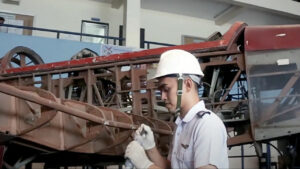Pinoy makes ‘green’ aviation sealant from lowly pili tree
A FILIPINO inventor from Batangas province has created the first locally made aviation sealant from the spent resin of pili trees.

By Almira Louise S. Martinez
A FILIPINO inventor from Batangas province has created the first locally made aviation sealant from the spent resin of pili trees.
PiliSeal from the indigenous Philippine tree, which is also used in industries like food and perfume, is environment-friendly and safe, Mark Kennedy E. Bantugon, president and chief executive officer at Pili AdheSeal, Inc., said in an interview.
“The smell of sealant in aviation can irritate our respiratory organs,” he told BusinessWorld in Filipino. Unlike the unpleasant smell of other sealants, PiliSeal has a fragrant and “essential oil” smell, he pointed out.
In contrast, the usual aviation sealants are toxic and have a rubber-like smell.
Mr. Bantugon, a licensed aeronautical engineer who also trained under an aircraft maintenance company, said only 10% of extracted raw Pili resin is used as a component in known perfume brands, while the rest goes to trash.
He said 155.39 million kilos of plant waste are produced in the country yearly. About 89 million kilos come from pili, according to the Department of Science and Technology.
Mr. Bantugon, who supports the circular economy, made PiliSeal to combat the health risks of commercial sealants, while making good use of discarded materials.
Pili resin is very sticky, which he found ideal as the key ingredient of his invention.
He added that PiliSeal’s resistance to extreme temperature sets it apart from the others, which either melt or get deformed.
“When you expose PiliSeal to higher temperatures, it only hardens, which is a good characteristic,” Mr. Bantugon said.
Pili farmers will play a vital role in the success of his venture, he said. He seeks to give about 15,000 local farmers a new income stream through his business.
“We have local farming communities who depend on us and believe that we can unleash many opportunities from pili,” he said.
Before discovering pili, Mr. Bantugon tested several types of resin from other trees, like the Antipolo tree.
Drawing inspiration from his childhood experiences during the rainy season, Mr. Bantugon first created a roof sealant from Antipolo tree resin in high school.
“During those times, our parents forced us to chew bubblegum to cover the leaks in our roof,” he said in Filipino.
Mr. Bantugon said he got about P20 million by participating in dozens of local and global competitions, which he used to develop his creation.
PiliSeal was the first Filipino invention to receive the World Intellectual Property Organization National Award for Inventors. He was also recognized by the United Arab Emirates Ministry of Economy.
PiliSeal will undergo pilot testing in Australia and Singapore in the last quarter or the first quarter of 2025. Its estimated retail price is P330 to P350 for a 295-ml tube.














